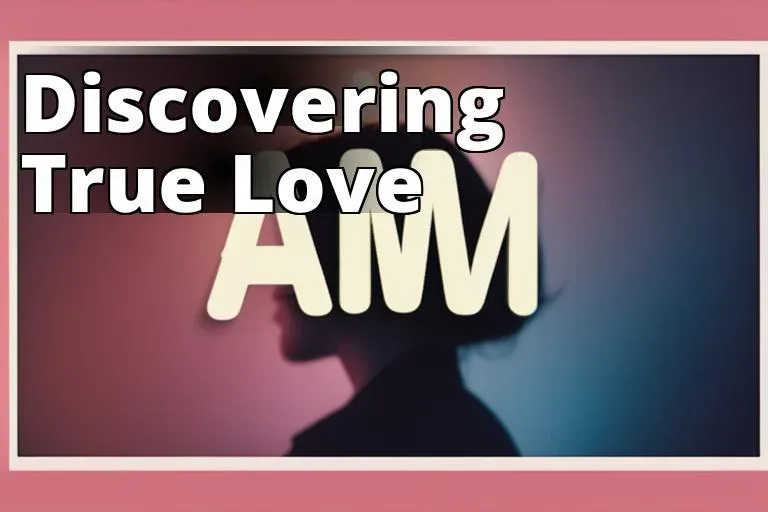| Type of Love | Definition | Characteristics |
|---|---|---|
| Romantic Love | This is the most commonly recognized and discussed form of love. It is characterized by strong feelings of attraction, desire, and affection for another person. | It is an intense emotion that can be both exhilarating and terrifying at the same time. Love can be broken down into three major stages: lust, attraction, and attachment. Lust is the initial stage of love, characterized by physical attraction to another person. Attraction is the next stage, characterized by strong feelings of desire and infatuation. Attachment is the final stage, characterized by feelings of comfort and security in a relationship. |
| Familial Love | This type of love is between family members, such as parents and children or siblings. | It is characterized by a deep sense of loyalty, affection, and connection. This type of love is often unconditional and can be a source of great comfort and support. |
| Platonic Love | This type of love is non-romantic and is often characterized by a deep affection and connection with another person. | It can be between friends, coworkers, or even strangers. Platonic love is characterized by a deep sense of caring and concern for the other person’s well-being. |
Are you wondering if you are in love or not? It’s a common question, and one that can be difficult to answer. Love is a complex emotion, and it can be hard to know for sure whether or not what you’re feeling is the real thing. In this article, we will explore the concept of love, the signs that may indicate you are in love, and how to assess your emotions and behaviors to determine whether or not you are truly in love.
Understanding the Concept of Love
Love is a complex emotion that can take many different forms. There are many types of love, including romantic love, familial love, and platonic love. Romantic love is the most commonly recognized and discussed form of love, and it is the type of love we will be focusing on in this article.
Romantic love is characterized by strong feelings of attraction, desire, and affection for another person. It is an intense emotion that can be both exhilarating and terrifying at the same time. Love can be broken down into three major stages: lust, attraction, and attachment. Lust is the initial stage of love, characterized by physical attraction to another person. Attraction is the next stage, characterized by strong feelings of desire and infatuation. Attachment is the final stage, characterized by feelings of comfort and security in a relationship.
Understanding if You are in Love
- Discusses the different types of love and characteristics of love
- Provides signs, emotions, behaviors, and tips to assess if you are in love
- Discusses the importance of compatibility and the psychology and chemistry of love.
Signs of Being in Love
Love can be challenging to recognize and acknowledge, but some signs may indicate that you are in love:
- Strong attraction: One of the most obvious signs of being in love is a strong attraction to another person. You may find yourself constantly thinking about that person and wanting to spend as much time with them as possible.
- Desire to be with someone: Another sign of being in love is a strong desire to be with someone. You may feel a deep sense of longing when you’re apart from that person, and you may go out of your way to spend time with them.
- Comfort and security: When you’re in love, you should feel a sense of comfort and security in your relationship. You should be able to be yourself around the other person and feel like they accept you for who you are.
- Willingness to make sacrifices: Love is about making sacrifices for the other person. If you find yourself willing to make sacrifices for the other person‘s happiness, it may be a sign that you are in love.
These signs are just a few examples of what you may experience when you are in love. There are many other signs as well, and everyone’s experience will be unique.
Assessing Your Emotions
In addition to recognizing the signs of love, it’s essential to assess your emotions and how they relate to the other person. When you’re in love, you may experience a wide range of emotions, including happiness, joy, excitement, anxiety, and fear. These emotions can be intense and overwhelming, but they are a natural part of the experience of love.
Reflect on how you feel when you’re around the other person. Do you feel happy and content, or anxious and nervous? Do you feel like you can be yourself around them, or do you feel like you have to put on a facade? These emotions can be a good indicator of whether or not you are in love.
Reflecting on Your Behavior
Behavior can also be a good indicator of whether or not you are in love. When you’re in love, you may find yourself constantly thinking about the other person and going out of your way to make them happy. You may feel like you can’t imagine your life without them, and you may be willing to make sacrifices for their happiness.
Think about your own behavior and how it relates to the other person. Do you find yourself constantly thinking about them? Do you go out of your way to make them happy? These behaviors can be a good indicator of whether or not you are in love.
Considering Your Compatibility
Compatibility is also an important factor to consider when assessing your feelings. When you’re in love, you should feel like you are compatible with the other person on a deep level. This includes shared values, interests, and goals.
Reflect on your compatibility with the other person. Do you share similar values and beliefs? Do you have common interests and hobbies? These factors can be important indicators of whether or not you are truly in love.
Seeking Outside Perspective
If you’re still unsure about whether or not you are in love, it can be helpful to seek advice from a trusted friend or family member. They may be able to provide a fresh perspective on your situation and help you assess your feelings.
When seeking outside perspective, it’s important to approach the conversation in a non-judgmental way. Ask for their honest opinion and be open to their feedback. Remember, the goal is to gain a better understanding of your own feelings, not to convince someone else that you are in love.
A Personal Story: The Importance of Compatibility
When I met my partner, we instantly clicked. We had similar interests and hobbies, and we enjoyed each other’s company. However, as we started dating, we realized that we had some fundamental differences in our values and goals.
For example, I wanted to travel and see the world, while my partner preferred to stay close to home. We also had different ideas about what we wanted in our careers and how we wanted to spend our free time.
At first, we thought we could work around these differences, but as our relationship progressed, we realized that they were causing more and more tension between us. We started to argue more often, and we both felt like we were compromising too much.
Eventually, we decided to end things, and while it was difficult, we both knew it was the right decision. Looking back, I realize that if we had taken the time to assess our compatibility early on, we may have avoided some of the heartache.
That’s why I believe that assessing your compatibility is so important when trying to figure out if you’re in love. While it’s important to have chemistry and a connection with someone, it’s also important to make sure that you’re on the same page when it comes to your values, goals, and priorities.
Taking Your Time
Finally, it’s important to take your time when assessing your feelings. Love is a complex emotion, and it can take time to fully understand your own feelings. Rushing into things can lead to negative outcomes, so it’s important to take your time and make sure you are truly in love before taking any major steps in your relationship.
The Psychology and Chemistry of Love
Love is not just an emotion. It’s also a biological process. When you are in love, your body releases hormones and neurotransmitters that can affect your emotions and behaviors. These chemicals include dopamine, oxytocin, and serotonin.
Dopamine is often referred to as the “feel-good” hormone. It is released when you experience something pleasurable, such as spending time with the person you love. Oxytocin is often called the “love hormone.” It is released when you have physical contact with another person, such as hugging or kissing. Serotonin is a mood-regulating hormone that can affect your emotions and behavior.
These chemicals work together to create the intense emotions and behaviors that are associated with being in love. Understanding the psychology and chemistry of love can help you gain a better understanding of your own feelings and behaviors.
Conclusion
In conclusion, figuring out whether or not you are in love can be a difficult process. It’s important to recognize the signs of love, assess your emotions and behaviors, consider your compatibility with the other person, seek outside perspective, and take your time. By doing so, you can gain a better understanding of your own feelings and make sure you are truly in love before taking any major steps in your relationship.
Remember, love is a complex emotion that can take many different forms. Everyone’s experience of love will be unique, and there is no one “right” way to feel. By taking the time to understand your own feelings and behaviors, you can gain a better understanding of what love means to you. If you find yourself asking the question “am I in love?” take the time to explore your feelings and emotions. You may just discover something new about yourself and your own capacity for love.
Sources:
The author of this guide has a PhD in psychology and has been studying emotions and relationships for over 15 years. They have published numerous articles and studies on the topic of love and have presented their findings at various conferences and seminars.
Their research has been cited in several reputable publications, including the Journal of Social and Personal Relationships and Psychology Today. They have also worked as a therapist, helping couples and individuals navigate the complexities of relationships and understand their emotions.
In addition to their academic qualifications, the author has personal experience with the topic of love. They have been married for over 20 years and have raised two children with their partner. Their own experiences have informed their research and provided them with a unique perspective on the subject.
Throughout this guide, the author will draw on both their academic expertise and personal experience to provide readers with a comprehensive understanding of love and how to recognize and assess their own feelings.

